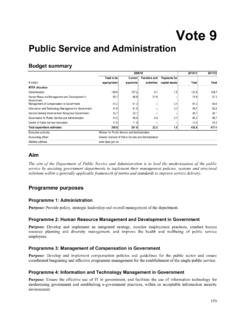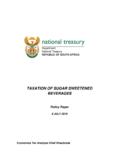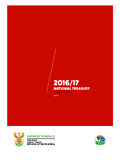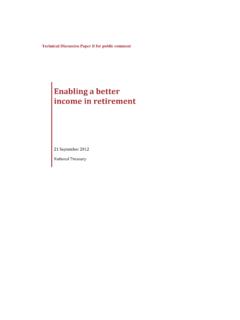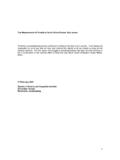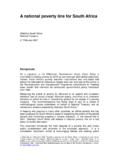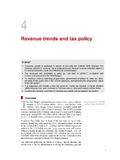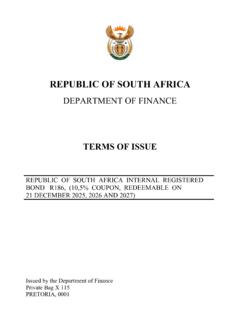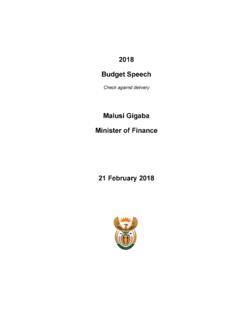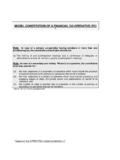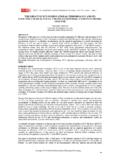Transcription of OECD Economic Surveys: South Africa 2010 - Treasury
1 OECD Economic Surveys South AFRICAV olume 2010/11 July 2010 OECD Economic SurveysSOUTH AFRICAV olume 2010/11 July 978-92-64-08318-9 10 2010 11 1 P-:HSTCQE=U]XV]^:Volume 2010/11 July 2010 Subscribers to this printed periodical are entitled to free online access. If you do not yet have online access via your institution s network contact your librarian or, if you subscribe personally, send an e-mail to Economic SurveysSOUTH AFRICASPECIAL FEATURE: EMPLOYMEnTISSn 0376-6438 2010 SUbSCRIPTIOn (18 ISSUES)Poland, April 2010 Portugal, June 2008 Romania, October 2002 Russian Federation, July 2009 Slovak Republic, February 2009 Slovenia, July 2009 South Africa , July 2010 Spain, November 2008 Sweden, December 2008 Switzerland, December 2009 Turkey, July 2008 Ukraine, September 2007 United Kingdom, June 2009 United States, December 2008 Most recent editionsAustralia, October 2008 Austria, July 2009 Belgium, July 2009 Brazil, July 2009 Canada, June 2008 Chile, January 2010 China, February 2010 Czech Republic, April 2010 Denmark, November 2009 Estonia, April 2009 Euro area, January 2009 European Union, September 2009 Federal Republic of Yugoslavia, January 2003 Finland, April 2010 France, April 2009 Germany, March 2010 Greece, July 2009 Hungary, February 2010 Iceland, September 2009 India, October 2007 Indonesia, July 2008 Ireland, November 2009 Israel, January 2010 Italy, June 2009 Japan, September 2009 Korea, April 2010 Luxembourg.
2 May 2010 Mexico, July 2009 Netherlands, June 2010 New Zealand, April 2009 Norway, March 2010 OECD Economic Surveys: South Africa2010 ORGANISATION FOR Economic CO-OPERATION AND DEVELOPMENTThe OECD is a unique forum where governments work together to address the Economic , socialand environmental challenges of globalisation. The OECD is also at the forefront of efforts tounderstand and to help governments respond to new developments and concerns, such as corporategovernance, the information economy and the challenges of an ageing population. The Organisationprovides a setting where governments can compare policy experiences, seek answers to commonproblems, identify good practice and work to co-ordinate domestic and international OECD member countries are: Australia, Austria, Belgium, Canada, Chile, the Czech Republic,Denmark, Finland, France, Germany, Greece, Hungary, Iceland, Ireland, Italy, Japan, Korea,Luxembourg, Mexico, the Netherlands, New Zealand, Norway, Poland, Portugal, the Slovak Republic,Spain, Sweden, Switzerland, Turkey, the United Kingdom and the United States.
3 The Commission ofthe European Communities takes part in the work of the Publishing disseminates widely the results of the Organisation s statistics gathering andresearch on Economic , social and environmental issues, as well as the conventions, guidelines andstandards agreed by its 978-92-64-08318-9 (print)ISBN 978-92-64-08319-6 (PDF)Series: OECD Economic SurveysISSN 0376-6438 (print)ISSN 1609-7513 (online)OECD Economic Surveys: South AfricaISSN 1995-3305 (print)ISSN 1999-0367 (online)Also available in credits: Cover Comstock/Comstock Images/Getty to OECD publications may be found on line at: OECD 2010 You can copy, download or print OECD content for your own use, and you can include excerpts from OECD publications, databases and multimediaproducts in your own documents, presentations, blogs, websites and teaching materials, provided that suitable acknowledgment of OECD as sourceand copyright owner is given. All requests for public or commercial use and translation rights should be submitted to Requests forpermission to photocopy portions of this material for public or commercial use shall be addressed directly to the Copyright Clearance Center (CCC)at or the Centre fran ais d exploitation du droit de copie (CFC) at OF CONTENTSOECD Economic SURVEYS: South Africa OECD 20103 Table of contentsTable of contentsExecutive summary.
4 8 Assessment and recommendations ..11 Chapter 1. Moving beyond the crisis and finding a new sustainable growth path..21 The 2008-09 Economic crisis..22 Emerging from the crisis ..32 Setting a course for rapid convergence on advanced country income levels ..36 Notes ..60 Bibliography ..61 Chapter 2. Strengthening the macroeconomic policy framework..65 The monetary policy framework has served the economy well, but should be strengthened ..67 Enhancing the stabilising role of fiscal policy and safeguarding sustainability..76 Notes ..86 Bibliography ..88 Chapter 3. Closing the labour utilisation gap ..91 Low labour utilisation remains South Africa s most salient problem ..92A range of demand- and supply-side factors have contributed to low employment levels ..97 Improving employment performance will require a range of policy actions .. 104 Notes .. 113 Bibliography .. 114 Annex The experience of OECD countries in raising employment.
5 117 Annex Recommendations of the 1994 OECD Jobs Strategy and the revisedJobs Strategy of 2005 .. National Credit Act of 2005 .. Africa as an illustration of the end-point problem in filtering estimates of potential output .. South African proposals and measures to reduce greenhousegas emissions.. of recommendations for emerging from the crisis and finding a new sustainable growth path .. of the South African Reserve Bank.. inflation targeting framework in South Africa .. of recommendations for macroeconomic policies ..85 TABLE OF CONTENTSOECD Economic SURVEYS: South Africa OECD experience of OECD countries with raising employment .. of recommendations for increasing labour utilisation .. Macroeconomic projections 2010-11 .. Steam coal prices .. Commodity-related revenues in selected commodity-exportingcountries, 2007.. Labour force participation rate by age and population group .. Narrow and broad measures of unemployment.
6 Unemployment rates by age and population group .. Unemployment rates by level of educational attainment .. Breakdown of working age population by age group.. Evolution of labour force participation rates by age category .. HIV prevalence .. GDP growth .. Breakdown of capital flows .. Terms of trade .. Share prices .. Growth slowdown and output fall during the crisis .. Private investment and employment growth .. House prices and consumption.. Contribution to GDP growth by activity and expenditure.. Pre-crisis financial position of banks .. Real short-term interest rates .. Indicators of activity .. Main export commodity prices .. HP filter estimates of potential growth .. Labour market dynamics during the crisis .. Potential GDP and output gap .. Real GDP per capita growth, average 2000-09 .. Convergence to OECD income levels in the BIICS countries.. Government s targeted growth profile.
7 Decomposition of PMR in Enhanced Engagement and other non-membercountries, 2008.. Investment and saving .. Real exports per capita of goods and services .. Real effective exchange rate .. Real effective exchange rate deviation from trend and current account balance.. Adjusted net saving .. Greenhouse gas emissions, 2005.. Greenhouse gas emissions trends .. Environmental taxes, 2007.. Unleaded petrol prices and taxes ..57 TABLE OF CONTENTSOECD Economic SURVEYS: South Africa OECD Electricity prices, June 2009 .. Inflation, inflation expectations and interest rates .. External debt by currency denomination .. Nominal and real effective exchange rate variability, Jan. 1999-Jan. 2010 .. Government finances .. Public debt and debt service cost .. Budget balance and government revenues, 1996- 2009 .. Public sector spending on infrastructure.. Headline and structural budget balances .. Output gap and decomposition of budget balance into structural and cyclical component.
8 General government gross debt .. General government total expenditure and GDP per capita .. Real income gaps and their composition .. Employment rate, 2000-09 .. Labour force participation rates .. Unemployment rate, 2008 .. Evolution of the NAIRU.. Youth unemployment rate, 2008 .. Youth unemployment rate (15-24) by racial group .. Real GDP growth .. Gold production and reserves .. South African exports world market share .. Real wages in the non-agricultural formal sector .. Economy-wide real wage trends .. Large declines in unemployment and changes in real wages .. 120 TABLE OF CONTENTSOECD Economic SURVEYS: South Africa OECD 20106 This survey was prepared in the Economics Department by Geoff Barnard andTatiana Lysenko under the supervision of Andreas W rg tter. Substantialcontributions were made by the following individuals: Justine Burns,Lawrence Edwards, Evan Gilbert, Cecil Mlatsheni, Duncan Pieterse andStan du Plessis.
9 Research assistance was provided by Corinne Chanteloup andsecretarial assistance by Josiane Economic survey of South Africa was discussed by the EconomicDevelopment and Review Committee on 12 May survey is published under the responsibility of the Secretary-General ofthe is the first Economic survey of South Africa . An Economic Assessment ofSouth Africa was issued in July about the survey and the Economic Assessment, as well as moreinformation about how Surveys are prepared, is available at book service that delivers Excel files from the printed page!Look for the StatLinks at the bottom right-hand corner of the tables or graphs in this book. To download the matching Excel spreadsheet, just type the link into your Internet browser, starting with the prefix. If you re reading the PDF e-book edition, and your PC is connected to the Internet, simply click on the link.
10 You ll find StatLinks appearing in more OECD STATISTICS OF South Africa ( 2009 , unless otherwise noted)THE LANDArea (thousand sq. km)1 221 THE PEOPLEP opulation (millions, mid-year) force (thousand, 15-64)17 383 Provinces (% of total population)Employment (% of total)Eastern and population growth (%, 2001-09) per sq. km. DOMESTIC PRODUCTG ross domestic productGross value added (% of total)In rand billion2 capita (USD, PPP, 2008)10 116 Industry and FINANCESC onsolidated government (2008/09, % of GDP)Central government gross debt (2008/09, % of GDP) TRADEE xports of goods and services (% of GDP) of goods and services (% of GDP) exports of goods (% of total)Main imports of goods (% of total)Machinery and transport and transport fuels, lubricants and related materials, inedible, except goods and fuels, lubricants and related and related CURRENCYM onetary unit: RandRand per USD (period average) SUMMARYOECD Economic SURVEYS: South Africa OECD 20108 Executive summaryA strong macroeconomic policy framework has helped to improve growth performance over thepast two decades, but the 2008-09 downturn highlighted the limitations of the domestic-demand-ledgrowth path which has characterised South Africa in recent years.
